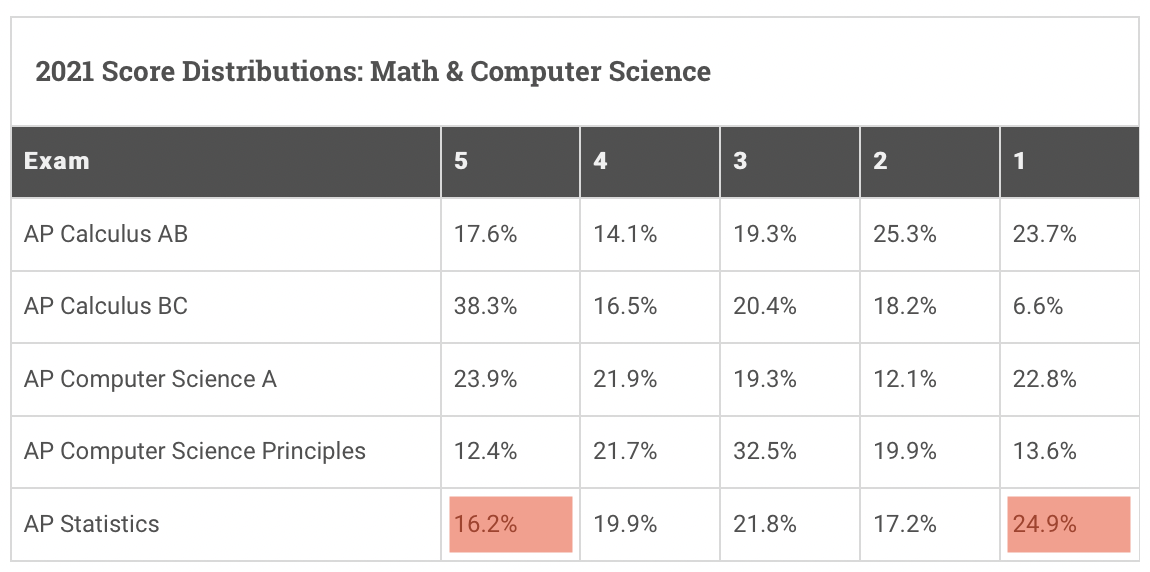
It’s the end of your junior year, you’re working hard to stay on top of all your current classes, finals are just around the corner, and you’re looking forward to your summer break. But the fall semester will be here before you know it, and you must start planning your courses for the next year. English, check. History, check. Language, check. Science, check. Electives, check. Easy. Your schedule is done. Except, of course, for that pesky Math class.
Well, maybe you don’t plan to be a Math major. Perhaps you don’t intend to go into a STEM field. So clearly you don’t plan to take AP Calculus (AB or BC), but you want one more AP class to add to your schedule. The natural choice would be AP Stats, then. After all, it is the easy Math class. Right?
If you’ve read this far, you probably already see the punchline coming: AP Stats isn’t “easy”. As a brief aside, I would caution students against assuming that any AP course will be easy. But we’re going to focus on the situation that our hypothetical student above found themselves in.
By foregoing AP Calculus in favor of the “easier” math class, AP Statistics, the student is hoping to earn an easy A to pad their senior year. I have probably worked with more than 30 students over the past few years on their statistics courses, both AP and regular, and I’ve witnessed the pitfall of this reasoning on many, many occasions. Students assume that AP Stats will be a relative walk-in-the-park while allowing them to earn college credit as well as boost their application.
But let’s look at some (forgive me) statistics. The following data can be found on the College Board’s own website.

I want to draw your attention to the two data points highlighted in red. You can see that a smaller proportion of the students who took the 2021 exams earned 5s on the AP Stats exam than either the AB or BC exam. And, perhaps more telling, a greater proportion (by a small amount compared to AB, fair enough) earned a 1 than either AB or BC Calc students. Similar results can be found for previous years, as well. The results for 2019 and 2018 showcase this even more dramatically. Of course, there may be additional factors that help explain these results beyond the argument that the AP Stats exam is more challenging than the other two. In fact, that’s not my argument at all.
I am arguing, however, that AP Stats is not a class to be discounted or overlooked. Along with the above results, I’ve worked with many bright students who struggle with AP Statistics. Unfortunately, they often won’t seek help until the semester is halfway through or worse, because they assume that they’ll get the hang of it eventually. I’ve had some students look for help well into the fourth quarter.
The truth is that Statistics can be a surprisingly difficult course for many students. While the calculations themselves aren’t overly challenging, the subtlety of the subject matter can be quite difficult to master, and this can cause students to perform poorly even when they think they are doing well. So many times, students will feel confident that they are on the right track only to find themselves stumbling right out of the gate on a problem. Between knowing which criteria must be met before performing a test, the sometimes-confusing language and notation, and complex subject matter, AP Statistics is far more than just calculating the mean, median, and mode.
I want to clarify that I’m not arguing that AP Stats is more challenging than Calc AB/BC. I don’t see any value in taking a position here. In fact, different students may find one more challenging than the other based on their own strengths and ways of understanding. But if students do decide to take AP Stats instead of Calc they should prepare for a challenging course. Make sure you understand not only the formulas (which are often fairly simple) but also when you can use them, why you use them, and what they tell you. And never assume that just because your teacher may give you formula sheets on exams/quizzes that your only responsibility is to plug-and-chug. That last point is a great rule of thumb for any Math class!
Finally, don’t be afraid to ask for help relatively early. As is the case with most classes, a bit of support before you’ve reached a level of panic about your level of understanding the material can do wonders for your confidence and your grade.